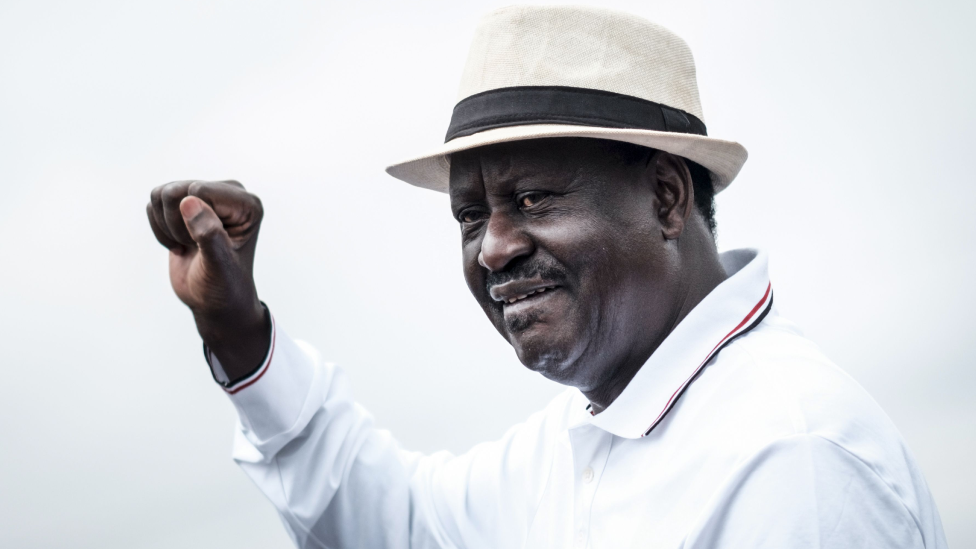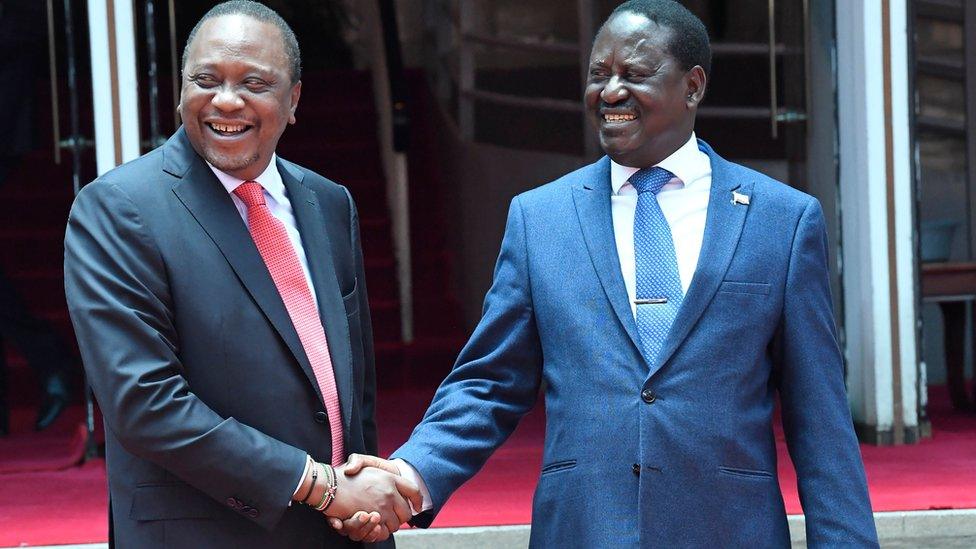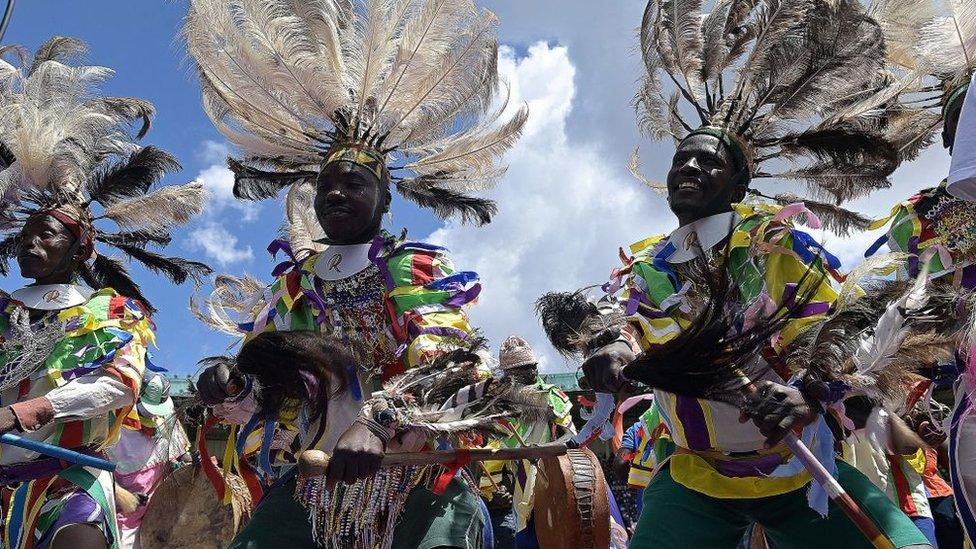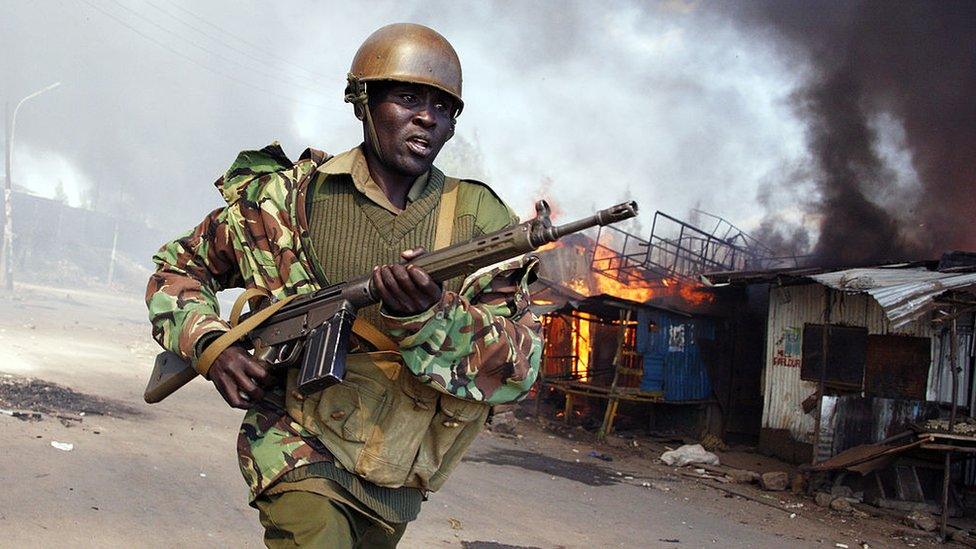Raila Odinga - Kenya's eternal candidate
- Published

While Raila Odinga comes from a famous family in Kenya, the political crown has eluded him throughout his decades-long career - just as it eluded his father, who served as vice-president after independence from the UK.
Aged 77, Mr Odinga made his fifth attempt at the presidency in the 9 August elections, having come closest to the top job in 2008 when he was appointed prime minister in a coalition government.
According to the official results, he narrowly lost but has, not for the first time, gone to court to challenge the outcome.
Mr Odinga has a passionate following, and his adoring fans have nicknamed him "Baba" (Father), "Agwambo" (Act of God) and "Tinga" (Tractor) - drawn from his party symbol in 1997 elections.
His signature slow-motion dance to reggae songs during his rallies has been dubbed "The Raila Dance".
A supporter of England's Arsenal football club, Mr Odinga forms a new political outfit in every election. He is contesting this election under the banner of Azimio la Umoja, Swahili for Pledge of Unity, as he tries to win over supporters of outgoing President Uhuru Kenyatta.
The two men - who represent the two biggest political dynasties in Kenya - were fierce rivals in the 2017 election, but made up the following year at a highly publicised event dubbed The Handshake.

Mr Odinga and Mr Kenyatta shook hands to end a long-running political feud
Mr Odinga is now promising to advance Mr Kenyatta's development agenda and improve the lives of vulnerable Kenyans by giving them a 6,000 Kenyan shillings ($50; £40) monthly stipend from a new social protection fund, if he is elected president.
Money for the fund, he says, will come by cracking down on widespread corruption.
Mr Odinga has also promised to provide affordable healthcare through what he calls "Baba Care", promoting himself as a fatherly figure in a nation of more than 56 million.
Female running mate
It is unclear if this is going to be the 77-year-old's last attempt at the presidency.
He previously described his 2017 presidential bid as his "last bullet".
But he explained his U-turn in an interview with BBC Focus on Africa TV's Sophie Ikenye in March 2022, by saying Kenyans had "asked him to run for president again because of the great faith" they had in him.
Mr Odinga chose former Justice Minister Martha Karua as his running mate. This is seen as historic - it is the first time a presidential front-runner has chosen a female deputy.
Together they are fronting a ticket that their campaign team has compared to US President Joe Biden and Vice-President Kamala Harris.
Mr Odinga banked on the key regions of central, western and coastal Kenya to give him more than 50% of the vote but he seems to have fallen just short.

Mr Odinga launched his campaign amidst much fanfare in December 2021
Mr Odinga is seen as the political heir to his father, Jaramogi Odinga. He was Kenya's first vice-president after independence, but walked out of the government in 1966 after falling out with then-leader Jomo Kenyatta, the father of the current president.
Jaramogi Odinga favoured closer ties with the Soviet Union and China, while Jomo Kenyatta preferred an alliance with the US and other Western powers.
Their differences worsened, with Jaramogi Odinga imprisoned for 18 months until he was released in 1971.
Raila Odinga is also a former political prisoner, and holds the record for being Kenya's longest-serving detainee.
His struggle against one-party dictatorship saw him detained twice (from 1982 to 1988 and 1989 to 1991) during the rule of Jomo Kenyatta's successor, Daniel arap Moi.
He was initially imprisoned for trying to stage a coup in 1982, which propelled him on to the national stage.
Mass mobiliser and master strategist
After multi-party democracy was introduced a decade later, he repeatedly failed in his attempt to win power, often saying he had been cheated of victory.
This led to one of the biggest crises in Kenya's history, when he was convinced that then-President Mwai Kibaki stole the 2007 election.
In post-election violence that followed, 1,200 people died and about 600,000 fled their homes.

Violence after the 2007 election was the worst in Kenya since independence in the 1960s
After mediation talks led by former UN chief Kofi Annan, he took the post of prime minister in a coalition government, but his relationship with Mr Kibaki was marred by what he called "supremacy wars".
In the 2017 election, he lost to Mr Kenyatta at the ballot box, but won in the Supreme Court, which nullified the result because of the widespread irregularities he had highlighted.
Mr Odinga however boycotted the re-run, citing the failure to create a level playing field.
It paved the way for the re-election of Mr Kenyatta, while Mr Odinga - reputed to be a master strategist and mass mobiliser - declared himself "the people's president" at a huge rally in the capital, Nairobi.
His supporters heeded his call to boycott the large number of businesses owned by the Kenyatta family to show their anger at the president's re-election.
It was just one of many protests they had staged over the decades to highlight their political and economic grievances. Some had turned violent, causing the loss of lives and massive disruption to the economy.
Raila Odinga: Kenyatta ‘helpless’ in the corruption fight
But since the 2018 reconciliation between Mr Odinga and Mr Kenyatta, Kenya has not seen a major protest, despite widespread anger over the rising cost of living.
The rapprochement saw the two men launch the "Building Bridges Initiative" to make far-reaching changes to the constitution, including reviving the post of prime minister.
Speculation was rife that in exchange for supporting his presidential bid, Mr Odinga would appoint Mr Kenyatta as prime minister, in a final move to end the rivalry between the two political dynasties.
But their plan collapsed after the High Court ruled that the president had acted unlawfully when spearheading the reforms.
Nevertheless, Mr Kenyatta still endorsed Mr Odinga, over his own Deputy President, William Ruto.
Mr Odinga is married to Mama Ida and together they have four children - the late Fidel, Rosemary, Junior and Winnie.
Fidel was named after Cuban leader Fidel Castro and Mr Odinga once explained that he chose the name because his son was born at the height of the Cold War, and "Mr Castro was seen to be standing against the US in the Vietnam war".
Continuing the dynastic tradition, the father was seen to have been grooming his eldest son as his successor, but Fidel died aged 41 in 2015.
In 2017 his daughter Rosemary declared an interest in running for member of parliament representing Africa's biggest slum, Kibera, which her father represented for 20 years.
She withdrew from the race, citing health concerns.
Mr Odinga is wealthy by Kenyan standards and has interests in liquid gas cylinder manufacturer, the East Africa Spectre, and ethanol production through the Kisumu Molasses Plant.
He comes from the Luo ethnic group - the fourth largest in Kenya. He is hoping that he will become the first Luo to clinch the presidency that has long eluded the Odinga dynasty.

WILLIAM RUTO: From chicken seller to president-elect
ANALYSIS: How Odinga's court challenges have improved Kenya's elections
BATTLE LINES: Dynasties v Hustlers
IN CHARTS: A nation explained
READ MORE: Full coverage
